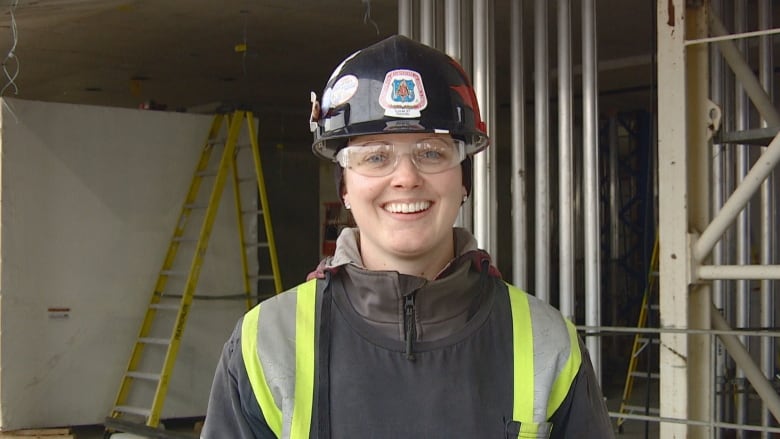Program offers opportunity to get into Toronto's booming construction industry
'Our industry desperately needs skilled workers,' says president of carpenters' union

Twelve stories above Front and Spadina, Stephanie Crarey stands on a ladder, working on an elevator shaft at The Well, one of the country's largest construction sites.
The 32-year-old doesn't have time to take in the unobstructed views of Toronto's skyline or Lake Ontario.
She's too busy working.
"I cut, I measure, I hammer, whatever they need done, that's what I do," she says with a smile.
She's a carpenter's apprentice. Something she started last year as a second career, after working a desk job with the provincial government.
"I'm loving what I'm doing, even though there are days when it's hard emotionally, physically, but at the end of the day I'm satisfied," said Crarey.
It's that kind of sentiment Mike Yorke hopes resonates with other young people, who may not have considered a career in construction.
"Our industry desperately needs skilled workers," says Yorke, the president of Carpenters District Council of Toronto.
"But we don't have enough skilled workers, so we're growing and developing our own through our apprenticeship program."

Construction industry 'desperately' needs skilled workers
Yorke says across Ontario, up to 500 carpenters are expected to retire every year for the next 10 years.
Between Toronto's booming condo construction, mixed use projects like The Well, and major transit projects such as the Eglinton LRT, he says replenishing workers in the field is critical.
That's where a pre-apprenticeship program, like concrete formwork, comes in.
The seven-week course is designed for people new to the construction industry, with little to no experience and is run out of the College of Carpenters and Allied Trades.

Cristina Selva, the college's long-time executive director, says the program offers students skills in a relatively short amount of time.
Eighteen students graduated from the course in November, she says, and by the following Monday, 16 were working — all hired by contractors, who then mentor students as they begin four-year apprenticeship training.
"It's our responsibility as a union, as a school, as a city, as a province, to help people otherwise who do not have an opportunity at bettering their lives. And bettering their lives means more than just a job."
"It means being afforded an opportunity to start working toward your career," said Selva, as she toured the college's sprawling training facility near Weston Road and Highway 407 in Woodbridge.

Warren Owl, 44, says he never thought he'd end up in construction.
He's worked a string of other jobs, but says he finally feels like he's found a career.
After he finishes the pre-apprenticeship program, he hopes to carry on to become a journeyman and then return home to the Sagamok First Nation, about an hour west of Sudbury.
"I'll be able to work anywhere, but preferably I'd like to go home and help out my community."
